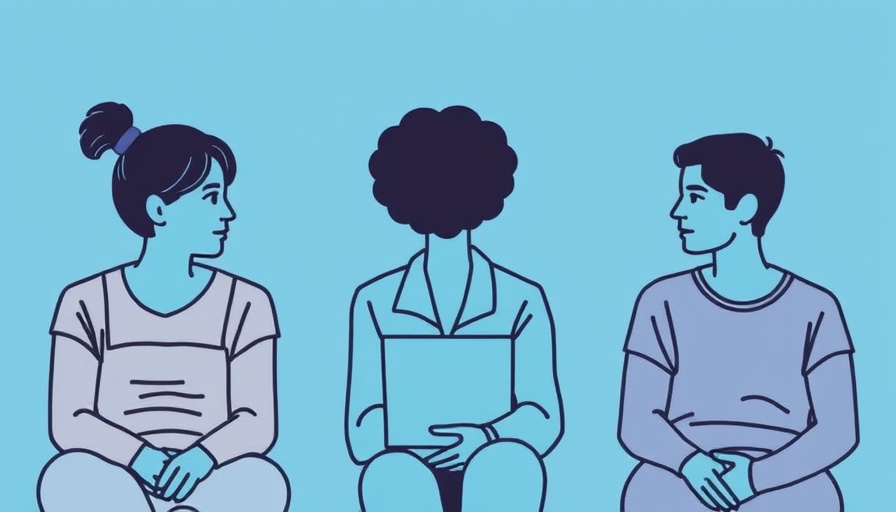
The Mental Health Crisis Facing Young Adults Today
In a rapidly changing world, young adults are confronting unprecedented challenges that significantly impact their mental health. Recent studies indicate a troubling trend: a staggering 94% of Gen Z youth report experiencing regular mental health challenges. This crisis can be attributed to a myriad of stressors including climate change, affordability issues, discrimination, and gun violence. Increasing pressures from social media also exacerbate these feelings, leaving many young adults feeling overwhelmed and isolated.
Understanding the Landscape of Youth Mental Health
The mental health landscape for young adults today is shaped by various factors. An alarming segment of the youth population feels unsupported, with nearly 25% reporting that they do not feel supported by their families. The impacts of the COVID-19 pandemic linger, with heightened anxiety and depression being prevalent among those aged 10 to 24.
Research from 2024 noted that 45% of young people struggled with their mental health in the two preceding years, and many did not receive adequate support. Disproportionately, youth of color and LGBTQIA+ young people face significant mental health challenges, yet the societal stigma surrounding mental health care often prevents them from seeking the help they need.
The Role of Social Media in Mental Well-Being
Social media presents a double-edged sword for young adults. While it serves as a platform for connection and community support, it also fuels feelings of inadequacy and anxiety. A report indicated that many young adults spend over four hours a day on social media; while 42% find their online interactions helpful, a significant percentage are also affected negatively, with body image issues being a major concern.
As many young adults express support for environmental activism and community engagement, the ability to share their concerns online has become crucial. Engagement in positive actions, such as cleaning up local parks or advocating for climate actions, often serves as an outlet for stress, indicating that while the digital space can encourage anxiety, it can also foster constructive community engagement.
The Importance of Open Conversations About Mental Health
It is imperative for parents, educators, and policymakers to actively engage with young people regarding mental health issues. Studies emphasize that many young individuals feel their voices are unheard, contributing to the stigma surrounding mental health issues. Programs that focus on peer support play an essential role; a considerable number of youths report having discussed their mental health with friends, indicating the importance of peer dialogue in coping strategies.
Additionally, organizations like Blue Shield of California’s BlueSky initiative are crucial in promoting youth mental health awareness, offering resources, and addressing the urgent needs of these communities. Their research includes identifying those who struggle with mental health and providing frameworks for schools and communities that prioritize emotional well-being.
Positive Trends Among Young Adults: Hope for the Future
Despite the heavy weight of mental health challenges, there is a beacon of hope. Over 60% of young adults express optimism about their future. Many are articulating their needs and taking proactive steps towards healing and advocacy. From participating in community initiatives to prioritizing self-care, young adults demonstrate resilience in the face of adversity.
Moreover, attention to youth mental health has prompted a receptive shift among mental health professionals, educators, and policymakers who are beginning to implement supportive measures. For instance, programs aimed at increasing mental health literacy, reducing stigma, and enhancing access to care through school-based interventions can create nurturing environments that empower young adults to seek help freely.
Actionable Steps for Parents and Communities
To effect change, it is vital for parents and communities to actively support young adults dealing with mental health issues. Engaging in open discussions, fostering patience, and showing understanding can transform the environment. Parents can initiate conversations about feelings, providing a safe space for youth to express their mental health challenges.
Communities need to invest in mental health resources, including counseling services and peer support initiatives. Furthermore, encouraging young adults to take part in decision-making regarding mental health policies will help ensure that their voices are heard and respected.
Concluding Thoughts: Building a Better Future
As the mental health crisis continues to unfold among young adults, the need for widespread awareness, open dialogue, and proactive support systems is clearer than ever. Collaboration between families, educators, and mental health advocates is essential in creating an environment where young people feel safe and supported. By prioritizing mental health and listening to the concerns of the youth, we stand a better chance of instilling hope and resilience in future generations.
 Add Row
Add Row  Add
Add 



Write A Comment